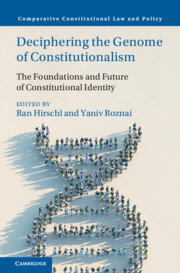Book contents
- Deciphering the Genome of Constitutionalism
- Comparative Constitutional Law and Policy
- Deciphering the Genome of Constitutionalism
- Copyright page
- Contents
- Figures
- Contributors
- Preface
- Acknowledgments
- Introduction
- Part I Foundations, Theory, and Concepts
- Part II Comparative Perspectives
- Part III American Constitutionalism and Constitutional Identity
- 14 “This Is (Not) Who We Are”
- 15 Constitutional Aspirationalism Revisited
- 16 The Constitution at War with Itself
- 17 Constitutional Identity, Constitutional Politics, and Constitutional Revolutions
- 18 American Constitutional Exceptionalism, Constitutional Identity, and Democracy
- Part IV Emerging Trends
- Index
- References
15 - Constitutional Aspirationalism Revisited
from Part III - American Constitutionalism and Constitutional Identity
Published online by Cambridge University Press: 14 March 2024
- Deciphering the Genome of Constitutionalism
- Comparative Constitutional Law and Policy
- Deciphering the Genome of Constitutionalism
- Copyright page
- Contents
- Figures
- Contributors
- Preface
- Acknowledgments
- Introduction
- Part I Foundations, Theory, and Concepts
- Part II Comparative Perspectives
- Part III American Constitutionalism and Constitutional Identity
- 14 “This Is (Not) Who We Are”
- 15 Constitutional Aspirationalism Revisited
- 16 The Constitution at War with Itself
- 17 Constitutional Identity, Constitutional Politics, and Constitutional Revolutions
- 18 American Constitutional Exceptionalism, Constitutional Identity, and Democracy
- Part IV Emerging Trends
- Index
- References
Summary
One of the core themes of Gary Jacobsohn’s work has been his observation that constitutional aspirations tend to develop within a disharmonic constitutional order. Jacobsohn draws our attention to Abraham Lincoln and Frederick Douglass as models for thinking about the unfolding of U.S. constitutional aspirations within a larger framework of constitutional disharmony. This essay revisits Jacobsohn’s theory of constitutional aspiration, including its underlying philosophical premises, and concludes by putting it in dialogue with recent revisionist accounts of the U.S. constitutional order that downplay, deny, or mute the aspirations that Jacobsohn’s body of scholarship highlights and celebrates.
Keywords
- Type
- Chapter
- Information
- Deciphering the Genome of ConstitutionalismThe Foundations and Future of Constitutional Identity, pp. 193 - 203Publisher: Cambridge University PressPrint publication year: 2024

